Right now, humanity stands at a crossroads. The action we do (or don’t) take is set to determine whether we will – or indeed, can – tackle our climate, biodiversity and social crises.
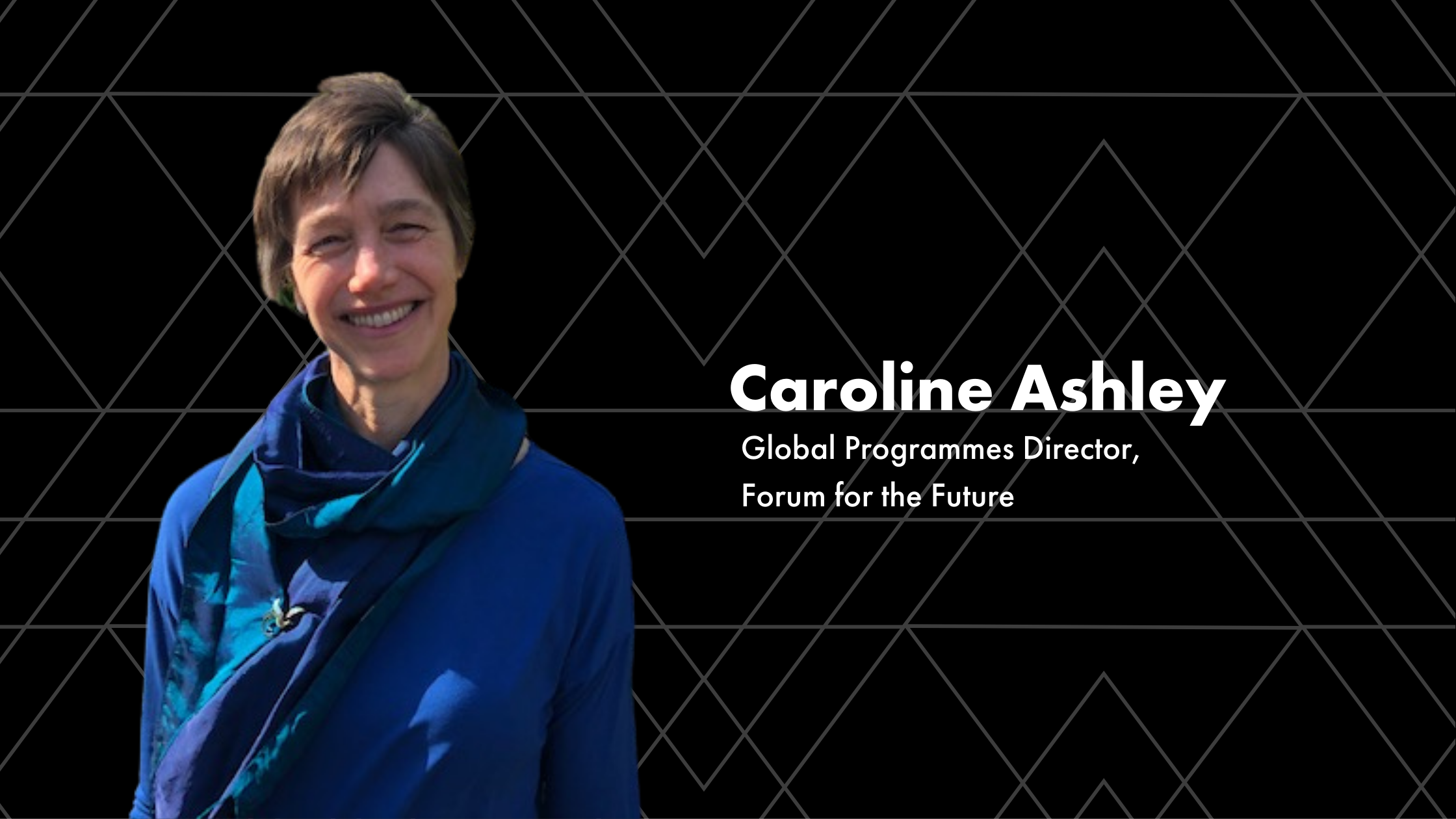
In the penultimate part of our Future of Sustainability: Looking Back to Go Forward series, Forum for the Future’s Global Programmes Director, Caroline Ashley, draws out key takeaways from all we’ve heard in the campaign.
Looking back, she reflects on three things holding progress up in the sustainability movement: piecemeal, shallow and/or short-term interventions; failing to effectively consider social justice; and investing in siloed activity that drives unintended consequences.
As part of going forwards, Caroline also reveals six things that will be vital to driving deep transformation: ensuring a truly socially just transition; multiple actors stepping up to help create and seize opportunities to drive change; shifting mindsets to build synergies, prioritise the long-term and work with turbulence; drawing on energy and innovation bubbling up at the edge of sustainability; not giving up, and not getting stuck; and, lastly, facing up to tough choices in shifting the very fundamentals of our manmade systems.
The time for action is now. Crises are here, and intensifying everyday. The planet is rapidly and dramatically changing around us and many of our long-established systems are now, quite simply, no longer fit-for-purpose given the complexity and intricacy of the social and environmental challenges we face.
The transformation needed must be deep and undoubtedly, much deeper than the efforts we are currently seeing around us. The scale of change required is one with the potential to infuse every single aspect of how we eat, live, produce, consume, work and relate to each other. Anything short of that will no longer cut it – and arguably, never has.
Far from being a doom and gloom picture, this moment is ripe for transformation and a fundamental reset. Now more than ever we have the potential to create a world that is better than the one we currently inhabit; a future that is more just, more regenerative, more in balance with the planet we all call home.
This opportunistic appetite for change is not unique (after all, it’s what’s driven the sustainability movement for decades), but it feels like the 2020s have brought with them a distinctly more decisive crossroads. As John Elkington so elegantly put it: right now feels like the “fulcrum between the old and new… There is a sense that there is something deeply broken in the current system, and therefore it’s only a matter of time before it decomposes in front of our eyes…. I think we’re right on the edge, the cusp, of things potentially changing but the question is, do they go in our direction or somewhere else?”
“Wouldn’t it be amazing if this moment in time… was talked about in 100 years? Not as the moment we sealed our own fate as a species, but as the moment we woke up, realized what we needed to do to transform our relationship with each other and with the planet, and got on with the job?”
Sally Uren and Jane Lawton kick off Forum’s Looking Back to Go Forward series.
So, if the time is right, and to some extent change is happening already – whether in response to COVID-19, extremely changing weather, wars, or demographics – why is it not adding up? Insights from Forum for the Future’s Looking Back to Go Forward campaign has revealed three critiques.
Current solutions are too piecemeal, shallow and short-term
In many sectors, there is a chase for quick solutions that do not address the root causes of issues or lay solid foundations for long-term change. Too often, these ‘solutions’ do not change the mindsets that really determine what we assume, what problems we see and what future we think is possible.
Consider, for example, corporate action on sustainability: Forum’s James Payne contrasts the ‘do no harm’ and ‘do good’ mindsets of well-intentioned businesses with a business mindset to seek a ‘just and regenerative’ future. It’s only the just and regenerative lens that will drive what’s needed: investment in the health of the whole system in which a business operates. Elsewhere, Forum’s Jonathon Porritt called time on’ corporate volunteerism’, arguing that while it’s well-intentioned, it’s simply not delivering. Government action is needed and, he suggests, the gold standard for corporates is now to advocate for that government intervention.
It’s a similar story in finance. On the surface, change over the last few years looks promising, with rapid expansion of ESG funds and adoption of net-zero targets. But – as I explored with Emilie Goodall – look a little deeper and it’s clear that ‘ESG labelled funds’ – now in their billions – are not redirecting finance into the new approaches needed at scale or changing the basic calculations behind financial return. Only more fundamental shifts will do that, whether it’s a move to systemic investing, redefining the purpose of our economy or reshaping the (now bygone?) structures of our financial systems.
Social justice is missing, separated, and/or tokenistic
Despite gaining prominence in recent decades, aspects of social justice aimed at ensuring the universal respect for human rights and equal opportunities continue to be overlooked or only tokenistically considered.
Forum’s Anna Biswas shared insights on this with respect to the growth of renewable energy in India. Anna vividly highlighted how the rush to scale renewables is leading to short-cuts in addressing land issues, human rights in the minerals supply chain, and inequitable decision making. Just because renewable energy is a clean alternative to fossil fuels, there is no excuse for the fact that “actors find it ‘impractical’ to comply with human rights norms in their value chains and social impact assessments”.
“Conversations and declarations around what a just transition really means have so far focused on the distribution of jobs and/or levies, rather than the deeper opportunity to rewire and reconfigure underlying systems to achieve greater equity, justice and regeneration by placing respect for universal human rights at the heart of transformational work.”
Anna Biswas commenting on the ‘just transition’ as part of Looking Back to Go Forward
Meanwhile, Ewi Lamma shared her personal experiences of a forestry project that was supposed to consult local communities, but instead directly bypassed hers – the users and managers of a Cameroon forest. The lesson here? Even when processes are in place, they often do not work unless real power – and how that power is used – changes.
Siloed approaches have driven unintended consequences, and will continue to if not addressed
Building on the wisdom of Donella Meadows, Forum’s Anna Birney and Jasmine Castledine reminded us not just of the interconnectedness of all things, but that “when we fail to respect this nexus, we cause harm”. History yields multiple examples where we have gotten things wrong, often trying to solve one problem while neglecting or causing another.
Take, for example: focusing on clean but not responsible energy; designing climate interventions that fail to consider biodiversity or recognise climate and nature as one single existential crisis; tackling hunger issues without addressing the fundamentals of food production.
On food, Dr Agnes Kalibata described the huge increase in food production, but noted that “in the process of turning food into a business, we probably went a little overboard, because increasing food production on a massive scale also played a huge part in climate change and biodiversity loss.”
Similarly, Forum’s Lesley Mitchell and Charlene Collison have seen repeated failure to see the interconnectedness of food and other systems. While food is finally being recognised as a critical part of climate strategy, and soil is being recognised as a carbon sink, many other factors and challenges are going unacknowledged. Among them: the ever-growing and increasingly unsustainable scale of the demands humanity is making on our finite land; the urgent need for regenerative approaches capable of restoring our soils and biodiversity; the need to support the livelihoods of land stewards experiencing change, especially as calls for climate adaptation as well as mitigation get louder.
In summary, these ‘looking back’ critiques point to what we need going forwards: not ‘the same, only faster’, but fundamentally different mindsets and pathways/approaches.
So what does this look like?
From ensuring social justice to making tough choices, six things we need right now
Based on what we’ve heard in Looking Back to Go Forward – from the practical ideas about specific sectors to shared wisdom on how to approach change – Forum is calling for six things if we’re to deeply transform at the scale and pace needed.
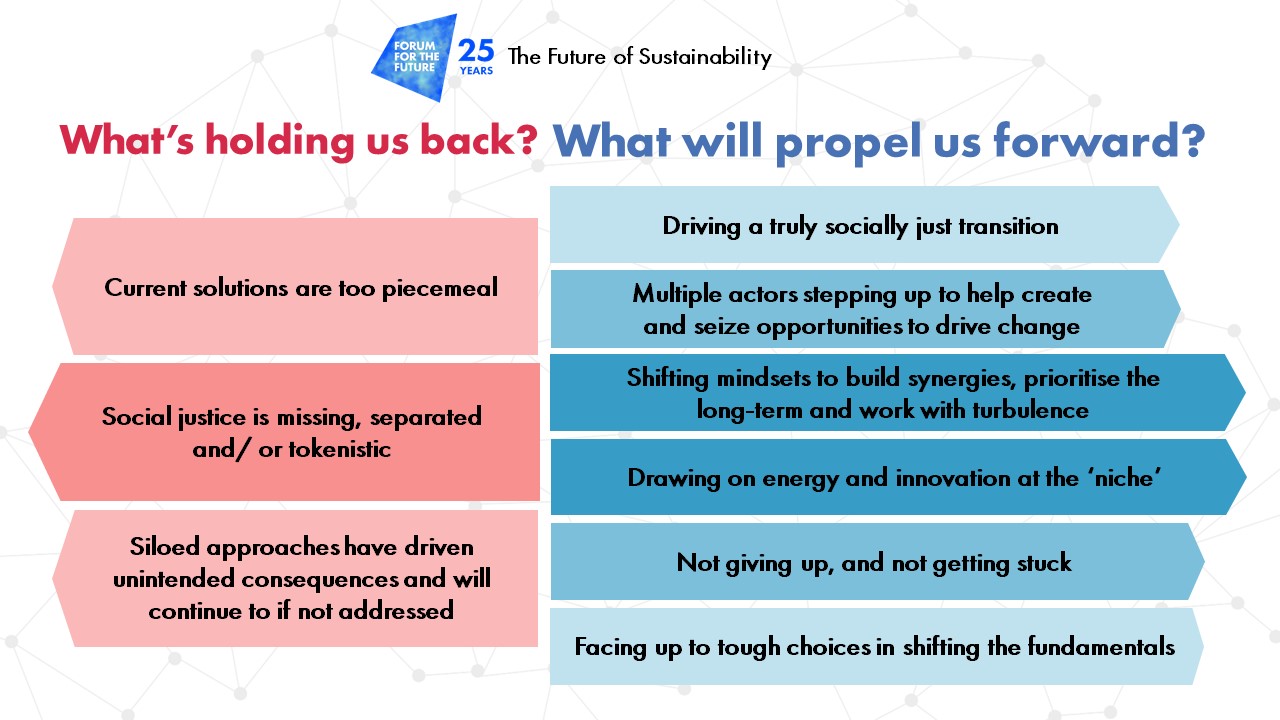
- Driving a truly socially just transition
Just adding a ‘social pillar’ to what we’re all doing is not enough. We must move beyond a narrow ‘managerial’ approach that looks to share the costs and benefits of transition differently, to ‘transformational’ transition (as coined by the Just Transition Research Collaborative). This means ‘[seeking] alternative development pathways to those built on continuous growth, explicitly dismantling systems of oppression and manifesting profoundly different human-environment relations.’
Inequalities between countries and sectors also need action. As Dr Kalibata reflected, the shift to electric vehicles in Europe and the US is being done according to a transition timetable. Yet for water-thirsty avocados, which underpin the livelihoods of many smallholders in Kenya and elsewhere, there’s no transition plan.
Meanwhile those on the frontline of climate change – and feeling the impacts most acutely – are often also those overlooked from the decisions that impact them most. Addressing inequalities between people must not be something we do ‘after the fact’ to ‘put things right’. It’s about hearing directly from those whose lives are affected, not tomorrow, but today
- Multiple actors stepping up to help create and seize opportunities to drive change
We’ve shared insights on the wide-ranging roles of government, business, scientists, citizens, communities, women, youth, consumers and more in driving change. In particular, regulation is critical. Change-actors from any stakeholder group need to help drive regulation that sets a higher standard. It’s not just about national governments – as Aaron Maniam highlighted, “… a lot of the biggest game-changers can come from sub-national units such as cities.”
“I hope we’ll see a lot more activity among cities, and greater complementarity between them and national governments.”
Aaron Maniam commenting as part of Looking Back to Go Forward
Communities, women, land-managers and those holding indigenous knowledge, must have a voice at the table. Ewi Lamma is putting change into practice in her community: “I asked the men, ‘Don’t you think your women, who have been managing the forest for a long time, will make great input if they are involved in decisions on its future? They are the mothers of your community and they will better understand the needs of your children”. Her efforts are delivering results, with more women taking up more positions, and she is confident they will fill 20% of leadership roles by 2025.
Archana Soreng shared with us the exclusion her community has experienced and the shoots of change: “Our whole world view is different from the developed world view. I come from a place where, in the past, we were constantly being made to feel inferior, that our knowledge and practices were inferior, and we were called ‘savage’ and ‘backward’. Nowadays, our traditional knowledge and practices are more acknowledged, but we still have to constantly push against this [dominant] developed world view.”
We heard a recurrent emphasis on working across generations – but, crucially, this does not mean leaving it to the young. I felt a tightening in my stomach at John Elkington’s framing: we need to address inter-generational issues and the inequity we have created because “if we can’t persuade younger people that these are societies worth investing their time and their effort in, democracy will… shrivel away”.
- Shifting mindsets to build synergies, prioritise the long-term and work with turbulence
A deep shift from short-term ‘fixes’ to long-term strategies is essential. The key natural and manmade systems on which we rely are interconnected and so our solutions must target intersections, such as the intersection of climate, nature and social justice – offering multiple benefits to multiple systems.
They must prioritise long-term returns and the health of the overall system.
And they must work with rather than attempt to get around turbulence. A deeply unsettled world is here to stay with various economic, social and environmental fallouts now inevitable. Accepting that, and building the capacity of people and ecosystems to adapt and thrive makes this turbulence less terrifying. It also strengthens our resilience and resolve, which – along with empathy and readiness, will be key to navigating the future.
This mindset shift sits at the heart of taking a just and regenerative approach. As James Payne outlined for business, it means focusing on potential, not just reducing harm. Or as Anna Birney and Jasmin Castledine explain, we need to lean into decline with empathy and attention to how we re-organise to build anew.
“A key element of systemic practice is to be awake to shifting contexts, in order to properly understand and work with their implications to leverage impactful change. What we are seeing emerge now are questions about how we deal not only with positive change but also the collapsing of systems; … How do we lean into decline in a way that creates the flourishing of new better systems? … This means engaging with the facilitative capacity for change, and the governance models that might support how we re-organise, as well as the emotional work required to deal with such change. Empathy is an essential practice of systems change”.
Anna Birney and Jasmine Castledine commenting as part of Looking Back to Go Forward
- Drawing on energy and innovation at the ‘niche’
There are many examples of exciting innovations bubbling at the edge, or ‘niche’, of sustainability. While these edges are not yet dominating the mainstream, they are essential spaces where new models are tested and prototyped.
Take for example, how six alternative economic models are challenging long-standing economic assumptions – from the purpose of money to the goals of regional development.
These ideas need to evolve and grow. Afterall, we can’t always tackle tomorrow’s challenges with yesterday’s thinking.
- Not giving up, and not getting stuck
We kicked off Looking Back to Go Forward with reflections on progress from 25 years of sustainability efforts and to be frank, the amount of change (not all good, but not all bad) is remarkable.
Dr Kalibata reminded us that when setting the Millenium Development Goals for 2000 – 2015, poverty was still seen as its own silo, quite separate from climate and entirely the responsibility of governments.
Johan Rockstrom reminded us just how little we initially knew about climate change. The journey since the early 1990s until today has been, and continues to be, dramatic. Remember that in 1996, the Intergovernmental Panel on Climate Change (IPCC) was only just establishing itself – fast forward, and its assessment reports regularly make headlines around the globe.
No one ever said change was easy; it’s about holding on to success, building from it, refusing to get stuck, embracing change, learning quickly and challenging ourselves to do better, to be more ambitious.
- Facing up to tough choices in shifting the fundamentals
There’s now no denying that our systems are a big problem. We must also acknowledge that their complexity means there is no single solution or silver bullet.
That means being open to challenging and changing some deep fundamentals. Are businesses here to drive profit for the few, or to support every community, supplier, employee and more that they touch? How can we redefine our economy? What is the true purpose of international and national politics? How can we really ensure universal human rights are respected as change gains momentum? And what are we all working towards as a collective sustainability movement?
As Archana Soreng calls out: “When people speak of development, it is really important to ask: ‘Development by whom, for whom, and for what?’”
The final word goes to Johan Rockstrom, who so eloquently captures the need to reframe the system:
“In some ways, leaders have understood that we have a problem… but at the same time still think that somehow we can muddle through along incremental, linear pathways that don’t in any way rock the boat of our current wealth creation models… That there are some quick fixes such as ‘green growth’ … and if we just try to recycle better and reduce waste and stop eating meat, we’ll save the planet! That I think is the symptom of failing to understand what the science has shown us: that this is a systems problem – that we’re hitting the ceiling of the entire planet’s capacity to be stable enough to support humanity.”
Johan Rockstrom
Watch this space…
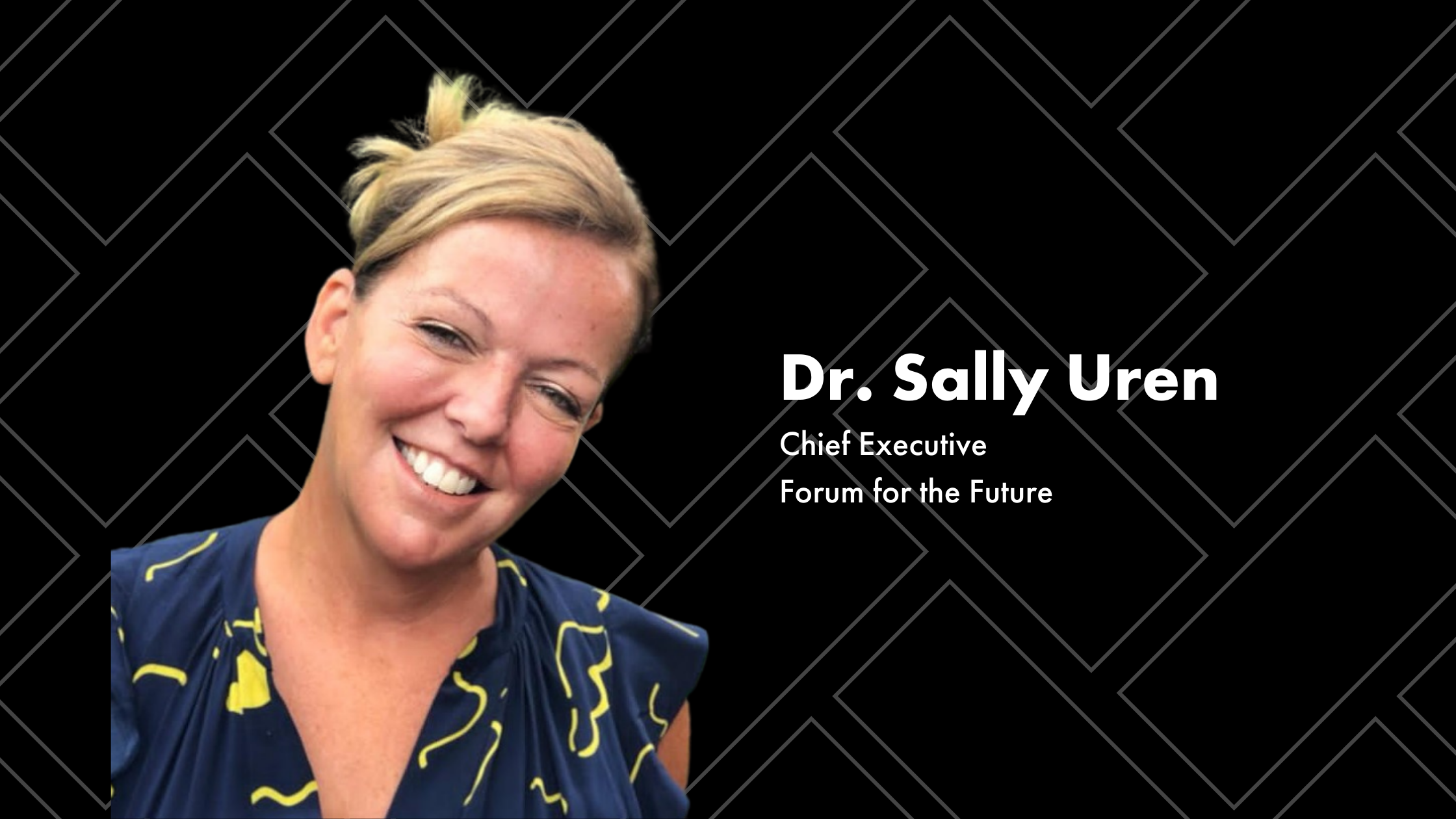
In the final of our Future of Sustainability: Looking Back to Go Forward series, Forum’s Chief Executive, Dr. Sally Uren, reflects on the personal implications of the above insights and what that means for priorities.
About the Future of Sustainability: Looking Back to Go Forward
Produced by international sustainability non-profit, Forum for the Future, the Future of Sustainability: Looking Back to Go Forward is a unique opinion and commentary series set to explore lessons learned from the last 25 years in the sustainability movement and what they mean for the future.
Based on new and exclusive insights from diverse voices across the sustainability movement, we’ll examine where we have succeeded and where we have failed in creating real change. We’ll consider how the world is responding to today’s multifaceted challenges and opportunities, and what pivots might be needed if we’re to deliver at scale and pace. Lastly, we’ll look forward – exploring how we can reframe the goals of the system, reset our ambition, and encourage the adoption of new mindsets and approaches critical to creating what’s really needed: a truly just and regenerative future.
With thanks to our partners
Looking Back to Go Forward was made possible thanks to the generous support from our partners: Laudes Foundation, GSK Consumer Healthcare, Target, M&S, Capgemini, Bupa, 3M, the Cosmetic Toiletry & Perfumery Association (CTPA), Burberry, Olam Food Ingredients, and in particular our headline sponsor, SC Johnson

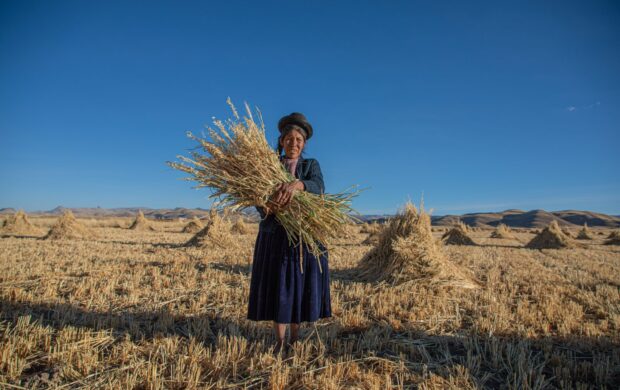


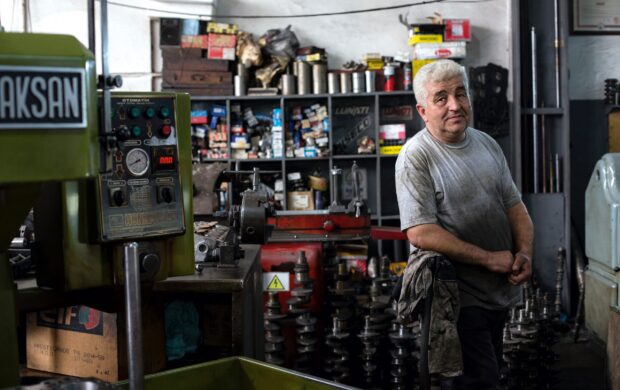




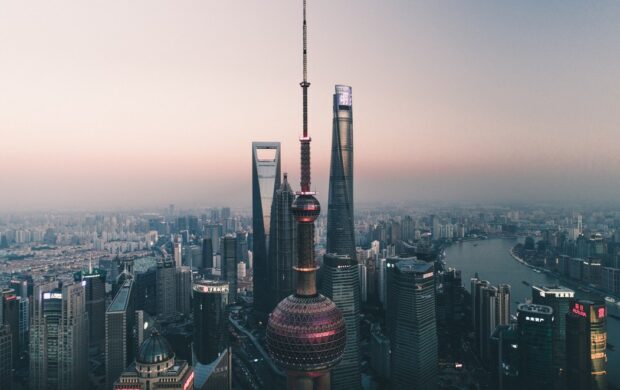

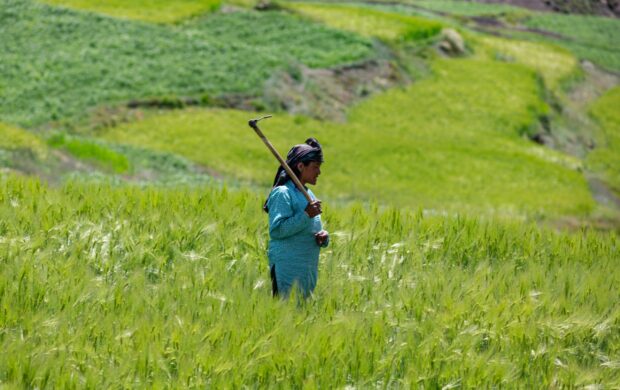
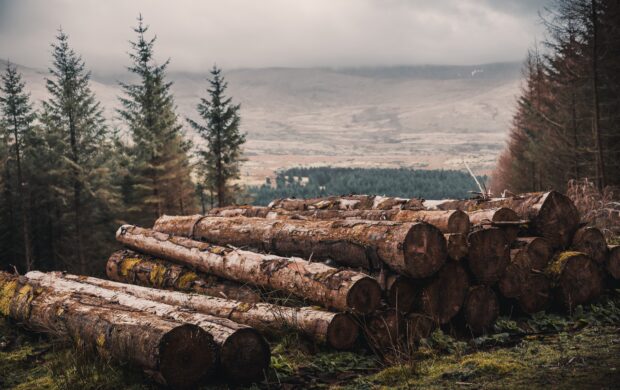



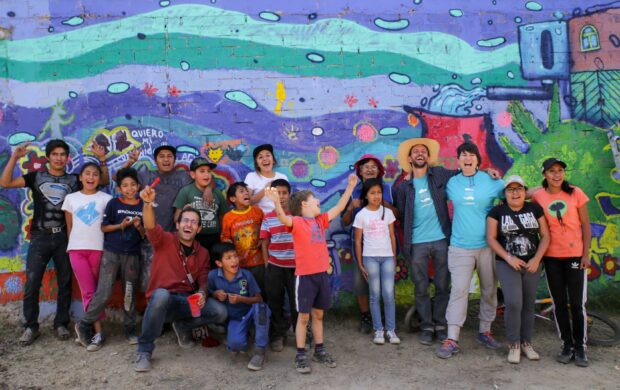
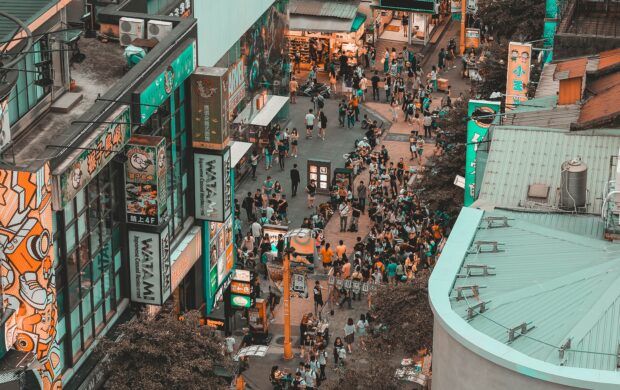
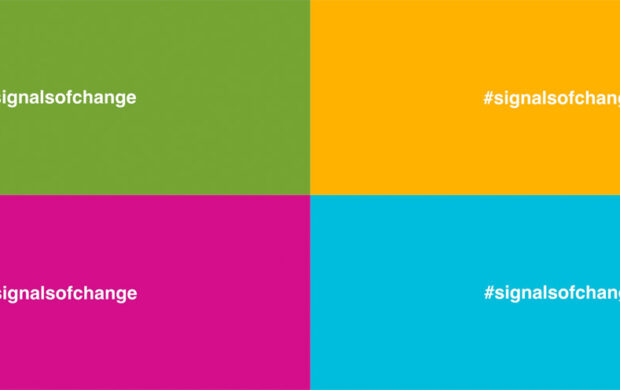


Amazing a good deal of beneficial information